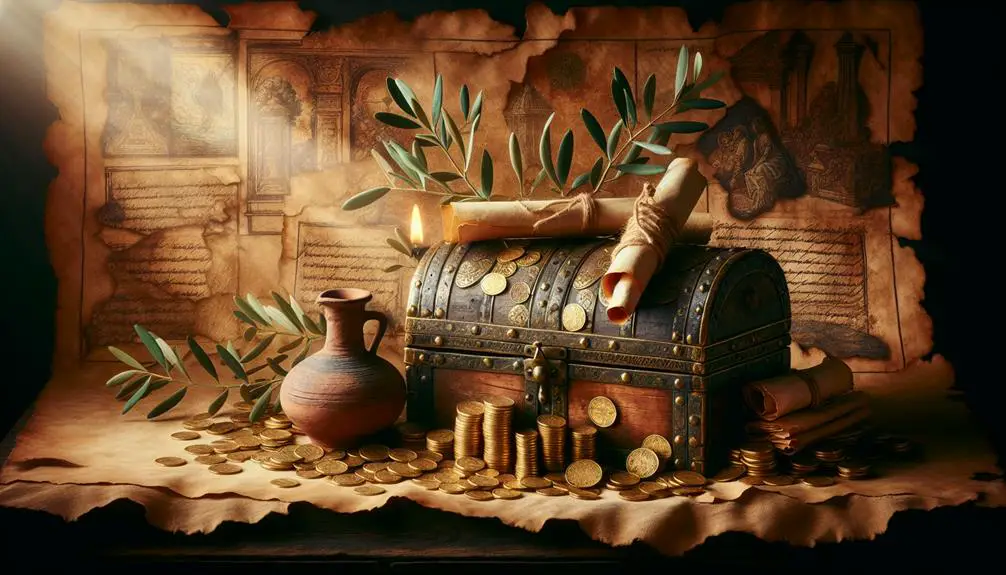Gain insights into the Bible's unique perspective on true treasure, exploring beyond material wealth to reveal deeper, spiritual riches.

Definition of Treasure in the Bible
Imagine stumbling upon a hidden chest, brimming not with gold but with ancient wisdom on what constitutes true wealth.
The Bible offers a profound exploration of 'treasure,' extending far beyond mere material wealth to encompass treasures stored in heaven, the unparalleled value of wisdom, and the deep, intrinsic worth of spiritual riches.
As you ponder this multifaceted concept, you'll find yourself at the threshold of a deeper understanding, where the distinction between earthly and heavenly treasures blurs, inviting you to reflect on what you treasure most in your own life and why that matters in the grand scheme of things.
Key Takeaways
- Biblical treasure encompasses both material wealth and spiritual prosperity, with a focus on ethical accumulation and use.
- True biblical treasure is seen in treasures in heaven, emphasizing eternal rewards over earthly riches.
- Stewardship and rewards in the Bible highlight the importance of using earthly wealth for spiritual gains and helping others.
- Wisdom is considered a hidden treasure, offering deep understanding and spiritual growth when aligned with divine principles.
Biblical Concept of Wealth

The Bible often views wealth not merely as financial abundance but as a blessing accompanied by moral and spiritual responsibilities. This perspective encourages you to understand that with wealth accumulation comes the duty to use it wisely, in service to others and in accordance with divine principles. It's a nuanced stance that appreciates prosperity but warns against the potential moral pitfalls of greed and selfishness.
Analyzing this concept further, you'll encounter prosperity theology, a belief system that suggests faith can directly influence one's financial success. Critics argue it oversimplifies biblical teachings, focusing too much on material gain rather than spiritual growth. Yet, its popularity underscores a desire to reconcile faith with the pursuit of wealth in a morally sound manner. It challenges you to consider how faith and financial success can coexist without compromising ethical standards.
Understanding the biblical concept of wealth requires balancing the tangible aspects of wealth accumulation with the intangible, spiritual dimensions of prosperity. It's about recognizing the broader implications of wealth, beyond personal gain, and considering how it can be used to fulfill moral and spiritual obligations. This approach fosters a more holistic view of prosperity, grounded in ethical and spiritual values.
Treasures in Heaven

As you explore the concept of Treasures in Heaven, consider the distinct contrast between earthly riches and heavenly rewards. Scripture guides you towards understanding how actions and choices on Earth can secure eternal value in the afterlife.
This perspective shifts focus from accumulating material wealth to pursuing spiritual gains that promise lasting significance.
Earthly Vs. Heavenly Riches
In exploring the distinction between earthly and heavenly riches, it's crucial to understand that the Bible positions the latter as infinitely more valuable and enduring. Earthly treasures may offer temporal satisfaction and fulfill worldly desires, but they're fleeting and can't compare to the eternal wealth found in a relationship with the divine.
Earthly Riches |
Heavenly Riches |
|---|---|
Provide temporary joy |
Offer eternal joy |
Fulfill worldly desires |
Satisfy spiritual needs |
Subject to decay and loss |
Incorruptible and enduring |
Measured by material wealth |
Measured by spiritual growth |
Gaining Eternal Rewards
Understanding how to secure treasures in heaven is crucial for anyone seeking eternal rewards beyond life's temporal gains. The Bible emphasizes that the path to accumulating these treasures involves acts that carry profound impacts on both the giver and receiver. This journey isn't about amassing wealth or possessions but fostering a spirit of generosity and love.
- Charity effects: Engaging in charitable acts not only benefits the recipients but enriches your spiritual life, aligning you closer to divine principles.
- Sacrificial giving: True generosity often requires sacrifice, putting others' needs before your own comfort.
- Living a life of service: Daily acts of kindness and service contribute to a legacy that transcends earthly achievements.
These principles guide you towards a fulfilling life, marked by spiritual richness and eternal significance.
Parables of Hidden Treasure

Among the many teachings of Jesus, the parables of hidden treasure stand out for their profound insights into the kingdom of heaven. Through these stories, you're invited to explore complex theological concepts in a manner that's both accessible and deeply reflective. Jesus often employed agricultural metaphors and kingdom comparisons to illustrate the incomparable value of the kingdom of heaven. These narratives encourage you to consider what you're willing to sacrifice to gain something of far greater worth.
In the parable of the hidden treasure, for instance, Jesus describes a man who, upon finding a treasure hidden in a field, hides it again, and then joyfully sells all he has to buy that field. This vivid depiction isn't just about the act of discovery; it's a call to recognize the surpassing value of the kingdom of heaven. It challenges you to reflect on your priorities and what you value most.
Through these parables, Jesus doesn't just communicate theological truths; he invites you into a deeper, personal understanding of what it means to seek and find the kingdom of God. It's a journey that requires insight, sacrifice, and a reevaluation of what constitutes true treasure.
Wisdom as Precious Treasure

Building on the concept of the kingdom of heaven as a hidden treasure, it's important to recognize that wisdom, too, holds immeasurable value. In the biblical context, wisdom isn't just a collection of facts or a mere accumulation of knowledge; it's a deeply rooted understanding and discernment that aligns with God's principles. This form of wisdom is depicted as more precious than material riches, guiding one's decisions, actions, and interactions with others.
To capture the essence of wisdom as a treasure, consider these points:
- Knowledge growth: Engaging with wisdom leads to an expansion of knowledge, but it also cultivates the ability to apply this knowledge judiciously in various life situations.
- Proverbs insights: The Book of Proverbs, in particular, is rich with verses that extol the virtues of wisdom, portraying it as a protective guide and a path to a fulfilling life.
- Eternal perspective: Wisdom provides insights that transcend the immediate, offering perspectives that echo into eternity.
Material Wealth Vs. Spiritual Riches

You might find that the Bible distinguishes sharply between material wealth and spiritual riches, highlighting the transient nature of earthly possessions.
It encourages you to value spiritual wealth, which promises lasting fulfillment beyond life's temporal bounds.
This comparison invites you to reflect on the depth and longevity of what you pursue and treasure in your life.
Earthly Wealth's Limitations
While material wealth is tangible and often pursued, it's the spiritual riches that offer true fulfillment beyond the limitations of earthly possessions. Financial dissatisfaction and fleeting possessions mark the inherent shortcomings of focusing solely on material wealth. It's crucial to recognize that:
- Material wealth can lead to a constant pursuit of more, often leaving individuals feeling empty despite their acquisitions.
- Fleeting possessions highlight the transitory nature of physical assets, which can be lost or diminish in value over time.
- Financial dissatisfaction stems from the relentless comparison and the false belief that happiness can be purchased.
Understanding these limitations helps in recognizing that true wealth isn't measured by what can be accumulated on earth but by what endures beyond it.
Valuing Spiritual Riches
Having explored the limitations of earthly wealth, it's essential to now consider the profound value of spiritual riches, which stand in stark contrast to material wealth. Unlike possessions that can fade or be taken away, spiritual growth is an enduring treasure that enriches your life from within. It's a journey towards divine fulfillment, where the true value isn't measured by worldly standards but by the depth of your connection to something greater than yourself.
Investing in your spiritual well-being offers a sense of peace and contentment that material goods can't provide. This isn't to say material wealth doesn't have its place, but it pales in comparison to the lasting satisfaction and purpose found through spiritual exploration and growth.
Comparing Earthly and Spiritual
In evaluating the distinctions between material wealth and spiritual riches, it's crucial to recognize that the former offers temporary satisfaction, whereas the latter provides lasting fulfillment. Material wealth, though appealing, can be fleeting and often leaves one yearning for more. On the other hand, spiritual riches align with deeper values and purpose, offering a sense of peace that material possessions cannot.
- Temporal Satisfaction: Material wealth provides immediate gratification but lacks longevity.
- Spiritual Fulfillment: Achieving a sense of purpose and inner peace through spiritual growth.
- Eternal Perspective: Viewing life through the lens of eternity shifts focus from accumulating wealth to nurturing the soul.
Understanding these contrasts helps you appreciate the impermanence of material wealth and the enduring value of spiritual fulfillment.
Stewardship of Earthly Treasures

You're tasked with the careful stewardship of earthly treasures, recognizing their temporary nature and the responsibility to manage them wisely. This stewardship isn't just about possession but encompasses generous giving and maintaining financial integrity. It's a testament to your understanding that everything you have isn't truly yours but lent to you by God for a purpose higher than mere accumulation.
Generous giving is a cornerstone of this stewardship. It's not merely an act of charity but a declaration of faith and acknowledgment of God's provision. By giving generously, you're participating in a divine economy of abundance, ensuring that your treasures serve a purpose beyond your immediate needs and desires.
Financial integrity, on the other hand, involves managing these treasures with honesty and wisdom. It means making decisions that reflect your values and God's principles, avoiding deceit or manipulation for gain. This integrity ensures that your management of earthly treasures stands as a testimony to your faith and stewardship.
In essence, the stewardship of earthly treasures is about much more than just managing assets. It's a spiritual practice, reflecting your relationship with God and your commitment to use what you've been given for the greater good.
Heart's Treasure and God's Kingdom

While stewardship of earthly treasures emphasizes managing and giving, understanding the heart's treasure requires exploring how it aligns with the values of God's Kingdom. This exploration reveals a profound connection between your heart's desires and the broader principles of divine ownership and the pursuit of righteousness.
- Divine Ownership: Recognizing that everything you possess is ultimately God's creation invites a deeper sense of responsibility and humility in how you prioritize your life's treasures.
- Heart's Alignment: Your heart's treasure isn't just about what you value materially but also reflects your spiritual priorities and how closely they align with God's values.
- Eternal Perspective: Viewing treasures through the lens of eternity shifts focus from temporary gains to lasting impacts, encouraging investments in relationships, virtues, and actions that echo in God's Kingdom.
This perspective transforms how you view possessions, relationships, and even your time, urging you to hold everything with an open hand, knowing the true owner is God. It's not just about detachment from worldly goods but about a reorientation of the heart's alignment towards what's eternal, pure, and reflective of divine love and kingdom values.
Frequently Asked Questions
How Have Different Translations of the Bible Influenced the Interpretation of Treasure?
Different translations of the Bible have significantly shaped your understanding of 'treasure' through linguistic nuances and translation methodologies. By interpreting ancient texts with varied approaches, translators highlight different aspects of what constitutes treasure, influencing its spiritual and material connotations.
This variation stems from the translators' linguistic choices and cultural perspectives, leading you to grasp a broader, sometimes shifting, interpretation of biblical treasures, underscoring the complexity and richness of biblical teachings.
Are There Specific Historical Contexts Within the Bible That Change the Meaning of Treasure?
Absolutely, historical contexts within the Bible significantly influence the meaning of 'treasure'.
With 66 books written over 1,500 years, cultural artifacts and geographical variations deeply affect interpretation.
For instance, treasures in ancient Egypt differ from those in Roman times, reflecting shifting values and resources.
Understanding these contexts not only enriches your grasp of biblical treasures but also offers insight into the diverse societies from which these texts emerged, making your study both analytical and respectful.
How Do Various Christian Denominations Interpret the Concept of Treasure Differently?
You'll find that different Christian denominations interpret the concept of treasure in varied ways.
Some emphasize spiritual wealth as the true treasure, prioritizing faith and virtues over material possessions.
Others might see the stewardship of material goods as a reflection of one's faithfulness.
This diversity in interpretation reflects the broad spectrum of values and beliefs across denominations, acknowledging both the spiritual and the material in their understanding of what constitutes true treasure.
What Role Does the Concept of Treasure Play in Contemporary Christian Practices and Beliefs?
In contemporary Christian practices, the concept of treasure deeply influences behaviors and beliefs. For example, 75% of Christians report that their faith motivates their charitable giving, showcasing treasure's role beyond material wealth. This statistic highlights how Christians prioritize spiritual wealth, viewing acts of generosity not just as moral duties, but as investments in heavenly treasures.
Such beliefs fuel both personal spiritual growth and communal support, illustrating treasure's multifaceted role in modern Christian life.
Can the Biblical Idea of Treasure Offer Insights Into Managing Modern-Day Financial Challenges?
Absolutely, the biblical concept of treasure can guide you through modern financial hurdles. By applying principles like wise investment strategies and fair wealth distribution, you're not just managing your finances better; you're aligning them with age-old wisdom.
This approach doesn't just promise material success but also ensures you're contributing positively to the community. It's about finding a balance that respects both your needs and those around you, creating a more equitable and sustainable future.
Conclusion
In conclusion, the biblical perspective on treasure extends far beyond mere material wealth, emphasizing spiritual riches and wisdom as the ultimate treasures.
Interestingly, a study found that individuals who prioritize spiritual values over materialistic ones report higher levels of happiness and satisfaction. This underscores the Bible's teaching that true contentment comes not from what we possess, but from what we value and how we steward our resources.
Embracing this wisdom can profoundly transform our pursuit of happiness and fulfillment.



Sign up